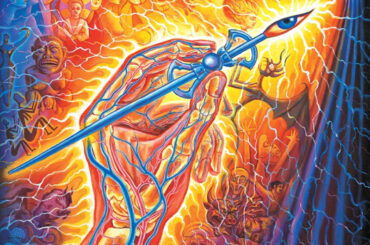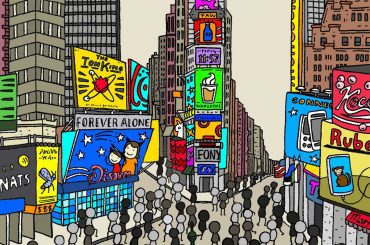Mark Fisher talks about the infinite demands of cyberspace, the low-level panic of being on social media, and the “shittiness” of the mobile interface. The talk took place at Studium Generale in Gent, Belgium in 2013.
We’re all hustling all the time. We’re hustling, we’re promoting. We’re all literally running around. We’re not just talking about technology here. That’s the important thing.
I mean, the missing word you could say here was capitalism capitalist cyberspace-time crisis. Because this isn’t simply about technology. This isn’t simply about the good old days before technology arrived and ruined things. And shouldn’t we go back to like, artisanal, locally baked bread made by peasants out of organic, you know, wool or whatever. But it’s definitely not about that.
But it is about, I mean, I think one question we have to ask ourselves is why are we now so obsessed with communication? I can tell you like, phone calls and letters in the 90s didn’t occupy that much of my time. You know, like a phone call, if I got a phone call from a friend, it might be nice. If I got a letter, you know, quite nice maybe. But I didn’t follow the postman around all day looking for a letter.
You know, like, but I see, I think what’s happened is that we now, for reasons that are not accidental, we now equate. Technology with communications technology. And that kind of bodies into this position, whereby you’re opposed to iPhones and cyberspace. That means you must be an anti-technological nostalgic who wants to go back to living and, you know, go back to like handwoven craft or something like that. No, it’s specifically about what Jodie Dean calls communicative capitalism this.
And we have to think of, why is the case that communication has become unmoored from any other purpose apart from itself? You can say like, you know, there was, you know, cybernetics as a science was a study of, you know, communication and control. That’s defined by Norbert Wiener when he invented the term in the 40s. But now we have control by communication, I would argue. And I think some of the best theorists on this writing the 70s actually, and I would say Jean Baudrillard, if you read back his texts about communication, the onset of communication, that these texts are amazing.
These texts now, read Baudrillard’s texts, “The Ecstasy of Communication,” which I think has maybe come out the late 70s or early 80s, a bloody long time ago. And this is basically the description of what it is to be on Twitter. You know, where you, if you read these texts, it’s all about the constant, the inability to construct a coherent self anymore in a face of this constant input, instantineity, a kind of schizo subjectivity, as Baudrillard puts it, which has no halo of private protection anymore. This was what you’ve, and when you go back to read these texts of Baudrillard, you think, what was he seeing in his own day with the bloody French Minitel system? And in the 80s, where you could barely make a phone call.
You know, it’s almost like he time traveled into our period and was writing about that in lots of ways. Because, so what we’re talking about then is a synergy between, and a really bad one, between the imperatives of the dominant form of capitalism now and certain communication technologies. The first thing you do, you go to a mobile device, you check in that kind of excited panic in which we do this kind of thing, and immediately feel this heavy weariness come over you. The weariness of the demands of cyberspace. The demands of cyberspace, which are literally infinite.
Then which, you know, you switch on, you switch on, you go on Twitter, right? Read this, be outraged about that. There’s something else we’ve got to be enraged about. And of course, with Twitter, you’re always in this reactive panic time. Because a lot of the time on Twitter, you’re struggling to find out what it is that the original topic is.
So you spend a lot of time scrolling back down, what are they talking about here? And what’s this about? Why is this person trending? And this low level panic, which of course is exacerbated by the actual shittiness of the mobile interface. Just think how crap these machines are.
How ill-suited for purpose. Like if you just think about it, think about it. Everything like, I think, Deleuze and Gattari, particularly Gattari argued about the plasticity of libido. That, you know, there’s no natural kind of, there’s no natural drives in human beings. You can produce desire out of any kind of assemblage.
This is fully vindicated by the whole thing with mobile phones and smart phones. Look, I mean, I noticed in Europe, much less than in London. You know, world capital of control addicts and kind of cyber spatial misery. Well, if you go to London, like everybody, everybody I mean almost mean almost without exception, is looking at their screens almost all of the time. And so what you’ve had, and think about that, that’s a massive behavioral change in the human population.
Over the course of not even a decade, you know, probably, you know, when do people start doing that? You know, maybe four or five years ago, looking at tiny screens. And this is what everyone’s doing. They’re not reading books. They’re reading newspaper quickly, but quickly get rid of that, for the fact it’s an important business, of looking at this really tiny screen, this really tiny screen that you can’t really see properly.
That’s what I mean about the crapness of it. Like, and touchscreen things are worst of all. They sort of slide out, they’re kind of bleary. You know, you replace this crisp digital interface, the keyboard, with this kind of slimy, kind of idiotic interface, you know, via touchscreen, which is really difficult to use. It’s not at all functional.
Just like, let’s think about the other day, it’s like we’re all in some weird game show. We have to send a message using, you have to send a message not really knowing in a really short amount of space, 140 characters, really quickly, you know, and you’re living like that all of the time. This is highly stressful, right? This is highly stressful. But that’s not even the kicker, even.
The kicker is that that’s not even the worst bit about it. We actually enjoy this.
Source: YouTube






